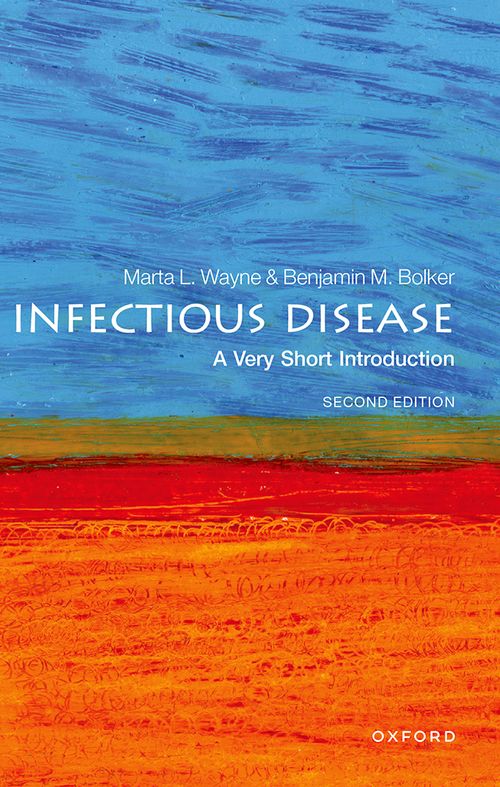Home >
A Very Short Introduction >
Infectious Disease (2nd edition) (Biology)
A Very Short Introduction | Biology
Infectious Disease (2nd edition)
ISBN: 9780192858511
Series: A Very Short Introduction
Infectious Disease (2nd edition) (Biology)
A Very Short Introduction Infectious Disease (2nd edition) (Biology) Media > Books > Non-Fiction > Education Books Expect Delays of Up to 4 Weeks| Order Below |
ISBN
9780192858511 (10-digit ISBN: 0192858513)
- Description
- Key Features
- Series Description
- Table of Contents
- Introduces non-biologist academics to the field of epidemiology
- Places infectious diseases in the context of ecology and evolution
- Traces transmission pathways through ecological and sociopolitical factors
New to this Edition:
Infectious disease is a moving target: new diseases emerge every year, old diseases evolve into new forms, and ecological and socioeconomic upheavals change the transmission pathways that spread disease. But where does disease come from? How is it transmitted from one person to another? And why are some individuals more susceptible than others?
In this Very Short Introduction, Marta Wayne and Benjamin Bolker address these questions through the lenses of ecology and evolution. Assessing the management of outbreaks of diseases such as influenza, HIV/AIDS, cholera, and COVID-19, they provide specific examples to illustrate why major diseases still threaten populations all over the world.
Infectious disease is a moving target: new diseases emerge every year, old diseases evolve into new forms, and ecological and socioeconomic upheavals change the transmission pathways that spread disease. But where does disease come from? How is it transmitted from one person to another? And why are some individuals more susceptible than others?
In this Very Short Introduction, Marta Wayne and Benjamin Bolker address these questions through the lenses of ecology and evolution. Assessing the management of outbreaks of diseases such as influenza, HIV/AIDS, cholera, and COVID-19, they provide specific examples to illustrate why major diseases still threaten populations all over the world.
Oxford's Very Short Introductions series offers concise and original introductions to a wide range of subjects--from Islam to Sociology, Politics to Classics, Literary Theory to History, and Archaeology to the Bible.
Not simply a textbook of definitions, each volume in this series provides trenchant and provocative--yet always balanced and complete--discussions of the central issues in a given discipline or field. Every Very Short Introduction gives a readable evolution of the subject in question, demonstrating how the subject has developed and how it has influenced society. Eventually, the series will encompass every major academic discipline, offering all students an accessible and abundant reference library.
Whatever the area of study that one deems important or appealing, whatever the topic that fascinates the general reader, the Very Short Introductions series has a handy and affordable guide that will likely prove indispensable.
Please note: As this series is not ELT material, these titles are not subject to discount.
1: Introduction
2: Transmission at different scales
3: Influenza
4: HIV/AIDS
5: Cholera
6: Malaria
7: Amphibian chytrid fungus
8: SARS-CoV-2/COVID-19
9: Looking ahead
New to this Edition:
Infectious disease is a moving target: new diseases emerge every year, old diseases evolve into new forms, and ecological and socioeconomic upheavals change the transmission pathways that spread disease. But where does disease come from? How is it transmitted from one person to another? And why are some individuals more susceptible than others?
In this Very Short Introduction, Marta Wayne and Benjamin Bolker address these questions through the lenses of ecology and evolution. Assessing the management of outbreaks of diseases such as influenza, HIV/AIDS, cholera, and COVID-19, they provide specific examples to illustrate why major diseases still threaten populations all over the world.
Infectious disease is a moving target: new diseases emerge every year, old diseases evolve into new forms, and ecological and socioeconomic upheavals change the transmission pathways that spread disease. But where does disease come from? How is it transmitted from one person to another? And why are some individuals more susceptible than others?
In this Very Short Introduction, Marta Wayne and Benjamin Bolker address these questions through the lenses of ecology and evolution. Assessing the management of outbreaks of diseases such as influenza, HIV/AIDS, cholera, and COVID-19, they provide specific examples to illustrate why major diseases still threaten populations all over the world.
Key Features
- Introduces non-biologist academics to the field of epidemiology
- Places infectious diseases in the context of ecology and evolution
- Traces transmission pathways through ecological and sociopolitical factors
Series Description
Oxford's Very Short Introductions series offers concise and original introductions to a wide range of subjects--from Islam to Sociology, Politics to Classics, Literary Theory to History, and Archaeology to the Bible.
Not simply a textbook of definitions, each volume in this series provides trenchant and provocative--yet always balanced and complete--discussions of the central issues in a given discipline or field. Every Very Short Introduction gives a readable evolution of the subject in question, demonstrating how the subject has developed and how it has influenced society. Eventually, the series will encompass every major academic discipline, offering all students an accessible and abundant reference library.
Whatever the area of study that one deems important or appealing, whatever the topic that fascinates the general reader, the Very Short Introductions series has a handy and affordable guide that will likely prove indispensable.
Please note: As this series is not ELT material, these titles are not subject to discount.
EASY ORDER FORM
PRICES LISTED INCLUDE CONSUMPTION TAX
Price Before Tax:
¥1,790


